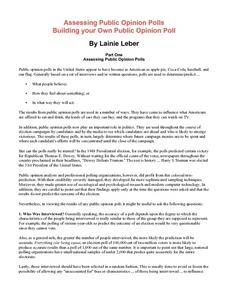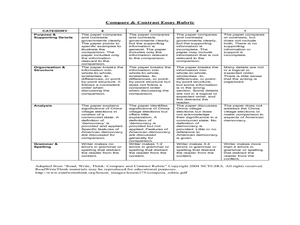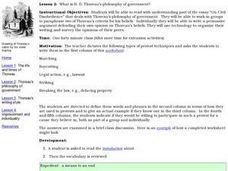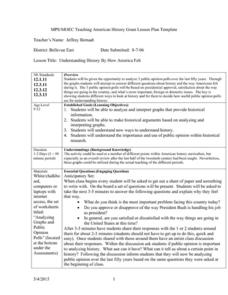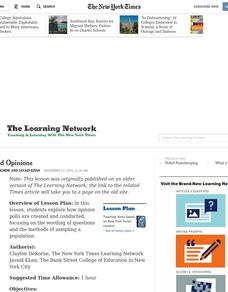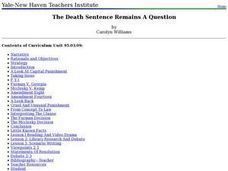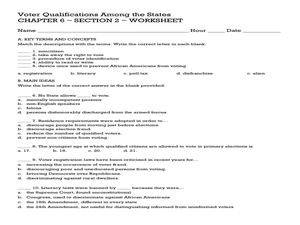Curated OER
Opinion Poll-arities
Learners explore the mathematics behind opinion polls, as well as provides a framework for interpreting trends in opinion poll graphics.
College Board
Civic Knowledge and Action in AP U.S. Government and Politics
Vote, it's your civic duty! The high school lesson focuses on voter turnout and civic participation with a series of activities. Young scholars analyze data to discover voter turnout trends, complete worksheets, and participate in group...
Curated OER
Political Polls
Students explore politcical polling by conducting a poll of student body elections. They prepare a survey, distribute forms, and tabulate data.
iCivics
Wanted: A Just Right Government
What type of government did American colonists gain and seek after gaining their independence after the Revolutionary War? Here is lesson that will guide your young learners through the new nation's progression from the Articles of...
Curated OER
Voting Simulation
Students explore the process of voting. They study the lawmaking branch of the state government.
Curated OER
Qualifying to Vote Under Jim Crow
Literacy tests, poll taxes, grandfather laws? Scholars study the systematic ways African-Americans were kept from voting even after it was made a law. They analyze a series of primary source documents, complete a worksheet, and engaged...
Curated OER
Assessing Public Opinion Polls
High schoolers are introduced to the purpose of public opinion polls. Using recent polls, they determine the demographics of who was interviewed and when and where the interview was conducted. In groups, they develop their own public...
Curated OER
Democratic Village Elections in China: Comparing Governments of China and the United States
Students explore democratic practices in China. In this global studies lesson, students compare and contrast democratic values of the Chinese government with the American government. Students read provided articles and conduct their own...
Curated OER
H.D. Thoreau's Philosophy of Government
Pupils read an essay by H.D. Thoreau as analysis of his philosophy on government. In this Thoreau analysis lesson, students work in groups to paraphrase two of Thoreau's criteria for his beliefs about government. Pupils write a...
Curated OER
Understanding History By How America Felt
Students explore public opinion of presidential decisions. In this history activity, students examine various graphs that depict overall American approval of U.S. Presidents and government decisions then answer questions about the...
Curated OER
Reviewing the Election Process by NOW Classroom for PBS
Students take a closer look at presidential elections. In this election process lesson, students discuss the roles of the primary, caucus, polls, Electoral College, delegates, and lobbyists in the process. Students then access the listed...
Curated OER
Conceptual Analysis in Economics
Students practice critical thinking skills by defending their beliefs orally in a "hot seat". In addition, they communicate their feelings about an inssue in writing.
iCivics
Separation of Powers
In a fun and informative simulation, your learners will act in groups as lead chefs, menu writers, and nutrition inspectors in deciding a new school lunch menu. They will then compare and contrast their experience to the interaction...
Constitutional Rights Foundation
Why Don’t More People in the U.S. Vote?
To vote or not to vote, that is the question. Secondary scholars explore voter turnout in the United States. The resource uses informational text, group discussion, and a worksheet to help academics understand hindrances to voting and...
Curated OER
Legislators and Representation - Executive, Federal and Interest Group Relations
Young scholars explore the interaction between the legislature and other governmental institutions. They watch videos exploring the relationship between the state legislature and two government institutions, and the role of lobbyists on...
Curated OER
Congressional Scenarios
In this U.S. government worksheet, students read 12 scenarios pertaining to government intervention and determine what to do as lawmakers in response to each of the scenarios.
Curated OER
Measured Opinions
Students read "Public Is Wary but Supportive on Rights Curbs," at the New York Times online. They explore how opinion polls are created and conducted, focusing on the wording of questions and the methods of sampling a population.
Curated OER
'Hunger Games' Science: Investigating Genetically Engineered Organisms
In The Hunger Games novel and movie, a futuristic, dystopian society is the setting. In it, a genetically engineered bird escapes control of the government. Using this as a starting point, teenagers examine the realistic possibility of...
Curated OER
Who Could Have Been Who
Can word choice affect a candidate's likeability? Use a New York Times lesson to explore how a presidential candidate's likeability factor can fluctuate in public opinion polls. Young readers choose a presidential election from their...
Curated OER
The Bill of Rights
In groups, learners review one of four selected Supreme Court cases. The whole class watches a video introducing the four cases, and then small groups dive into Internet research in an attempt to write a two-paragraph summary of the...
Teaching Tolerance
Why Local Elections Matter
Uncle Sam wants everyone to vote in local elections! Geared toward middle and high school scholars, the resource explores voter turnout and the importance of local elections. Academics participate in group discussion, complete...
Curated OER
The Death Sentence Remains A Question
Examine the results of recent opinion polls on where people stand on the issue of the death penalty. In groups, middle schoolers examine various cases dealing with this issue and discuss the judgments. They write their own argument for...
Curated OER
Democracy: Understanding the Canadian Parliamentary System
Students study democracy, levels of Canadian government and the responsibilities of elected officials. They write letter's to the Prime Minister about their pride in Canada.
Curated OER
Voter Qualifications Among the States
Twelfth graders research the voting qualifications for each state. In this American Government lesson, 12th graders complete a worksheet on the main ideas they have researched.




